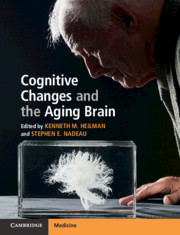Book contents
- Cognitive Changes and the Aging Brain
- Cognitive Changes and the Aging Brain
- Copyright page
- Dedication
- Contents
- Contributors
- Chapter 1 Introduction
- Chapter 2 Anatomic and Histological Changes of the Aging Brain
- Chapter 3 Cellular and Molecular Mechanisms for Age-Related Cognitive Decline
- Chapter 4 Neuroimaging of the Aging Brain
- Chapter 5 Changes in Visuospatial, Visuoperceptual, and Navigational Ability in Aging
- Chapter 6 Chemosensory Function during Neurologically Healthy Aging
- Chapter 7 Memory Changes in the Aging Brain
- Chapter 8 Aging-Related Alterations in Language
- Chapter 9 Changes in Emotions and Mood with Aging
- Chapter 10 Aging and Attention
- Chapter 11 Changes in Motor Programming with Aging
- Chapter 12 Alterations in Executive Functions with Aging
- Chapter 13 Brain Aging and Creativity
- Chapter 14 Attractor Network Dynamics, Transmitters, and Memory and Cognitive Changes in Aging
- Chapter 15 Mechanisms of Aging-Related Cognitive Decline
- Chapter 16 The Influence of Physical Exercise on Cognitive Aging
- Chapter 17 Pharmacological Cosmetic Neurology
- Chapter 18 Cognitive Rehabilitation in Healthy Aging
- Chapter 19 Preventing Cognitive Decline and Dementia
- Index
- References
Chapter 1 - Introduction
Published online by Cambridge University Press: 30 November 2019
- Cognitive Changes and the Aging Brain
- Cognitive Changes and the Aging Brain
- Copyright page
- Dedication
- Contents
- Contributors
- Chapter 1 Introduction
- Chapter 2 Anatomic and Histological Changes of the Aging Brain
- Chapter 3 Cellular and Molecular Mechanisms for Age-Related Cognitive Decline
- Chapter 4 Neuroimaging of the Aging Brain
- Chapter 5 Changes in Visuospatial, Visuoperceptual, and Navigational Ability in Aging
- Chapter 6 Chemosensory Function during Neurologically Healthy Aging
- Chapter 7 Memory Changes in the Aging Brain
- Chapter 8 Aging-Related Alterations in Language
- Chapter 9 Changes in Emotions and Mood with Aging
- Chapter 10 Aging and Attention
- Chapter 11 Changes in Motor Programming with Aging
- Chapter 12 Alterations in Executive Functions with Aging
- Chapter 13 Brain Aging and Creativity
- Chapter 14 Attractor Network Dynamics, Transmitters, and Memory and Cognitive Changes in Aging
- Chapter 15 Mechanisms of Aging-Related Cognitive Decline
- Chapter 16 The Influence of Physical Exercise on Cognitive Aging
- Chapter 17 Pharmacological Cosmetic Neurology
- Chapter 18 Cognitive Rehabilitation in Healthy Aging
- Chapter 19 Preventing Cognitive Decline and Dementia
- Index
- References
Summary
Our brains are continuously changing and these changes alter brain functions. With maturation, there is growth and unfortunately, even with healthy aging, decline. Aging-related decrements affect neurons and their connectivity, neurotransmitter systems, and even support systems such as glia. Aging affects some brain regions (frontal lobes and hippocampi) more than others. This book reviews and discusses aging-related changes and their influence on the major neurobehavioral domains, beginning with reviews of aging-related changes in anatomy and physiology. Subsequent chapters review cross-sectional and longitudinal studies of aging-related changes in sensory perception (vision, hearing, touch, smell, taste) and cognitive functions (memory, language, motor planning, attention, executive functions, emotions, creativity). In each chapter, mechanisms that may account for these changes are discussed. Declines related to aging per se are distinguished from declines related to aging-associated diseases. Final chapters discuss what can potentially be done to slow or reverse aging-related decline of cognitive functions, including exercise, cognitive rehabilitation, and pharmacological agents. It is hoped this book will help clinicians differentiate between normal aging processes and brain diseases, reduce the adverse effects of brain aging, and stimulate further research on how adverse effects of brain aging can be reversed, stopped, modified, or best managed.
Keywords
Information
- Type
- Chapter
- Information
- Cognitive Changes and the Aging Brain , pp. 1 - 4Publisher: Cambridge University PressPrint publication year: 2019
